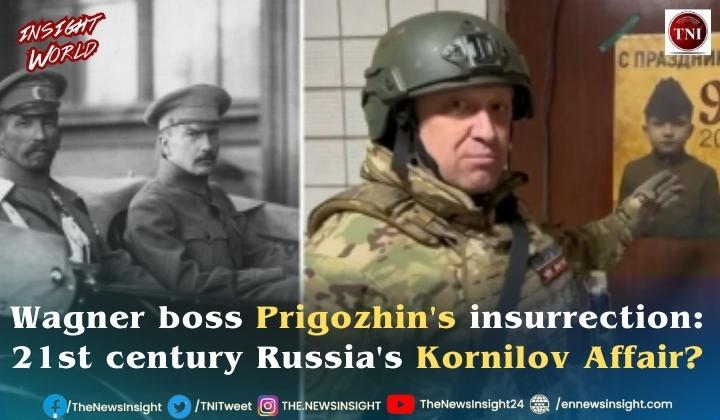Support Independent Journalism? Keep us live.
Evgeny Prigozhin, whose Wagner Group private military company is embroiled in what seems to be an armed insurrection against his rivals in the country’s top defence leadership, and increasingly, targeting President Vladimir Putin?
This was actually then Imperial Russian Army’s commander-in-chief, General Lavr Kornilov, who decided that the Provisional government that had come to power following the abdication of Tsar Nicholas II, and particularly, the revolutionary Petrograd Soviet in then Russian capital St Petersburg was not capable of steering the country in the difficult times it faced, and needed to be supplanted.
Russia, through the ages, has not been immune from sudden – and sometimes violent – changes in its ruling dispensation. There have been palace coups in which Tsars were forcibly made to abdicate or eliminated too, the famed October Revolution in which Lenin’s Bolsheviks seized power from the tottering and increasingly disliked Provisional government of Aleksandr Kerensky, the emergence of a collective leadership which came to power after Stalin’s death by eventually terminating some of his closest aides, the largely peaceful coup by which Nikita Khruschev was ousted, the revolt against Mikhail Gorbachev, and finally, Boris Yeltsin’s attack on Duma in which his Vice President and the Duma Speaker were charting a different course.
However, the scenario of a military coup has always been very uncommon in Russia – Tsarist, Soviet, or post-Soviet.
This was true even in the era of powerful generals like Marshal Georgy Zhukov, who aided the Khruschev faction in coming to the top by bringing the armed forces behind them instead of striking out on his own – and a few years later, went quietly after the rulers accusing him of “Bonapartism”.
Even in new democratic Russia, the outspoken General Alexander Lebed, who was unceremoniously dumped by Yeltsin as National Security Advisor – a post offered to him after coming close in the presidential polls – did not seek to stir a row.
So, the closest to the ongoing ‘Prizoghin Affair’ was the Kornilov Affair of August/September 1917, amid the tumult of World War I.
Kornilov, who had a better record in that consequential conflict than many other of his fellow Russian generals, was appointed the commander-in-chief after his predecessor Aleksei Brusilov’s famed offensive – which notched some successes – ran out of steam and increased resentment in the army. The Kerensky Offensive, which also petered out unsuccessfully, further ramped up the tensions.
It was in this millieu that Kornilov decided to take a hand in political affairs.
However, it ended rather unhappily for the General, whose intended aim was to create and prop up what he deemed to be a suitable government, but he actually ended up in undermining the first liberal government that Russia had ever seen in centuries of autocratic rule, his own arrest, and increasing support to Lenin’s Bolsheviks, who helped counter the march of his troops.
He and some of his supporters managed to escape from jail and entered the subsequent Russian Civil War on the anti-Bolshevik side, where he vowed that the goals of his forces must be fulfilled even if it was needed “to set fire to half the country and shed the blood of three-quarters of all Russians”.
However, Kornilov did not make much headway and he and most of his staff were killed in Bolshevik shelling of their headquarters in April 1918. He was so reviled that the Bolsheviks, after taking the area where he was buried, dug out his remains, and burnt them on a rubbish pile.
Perhaps, his example made future Russian generals chary of following his example – until Prigozhin – a self-styled general, it must be noted. (IANS)


Comments are closed.